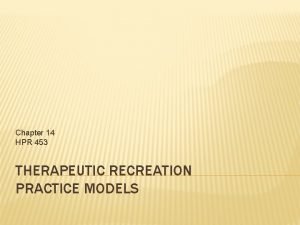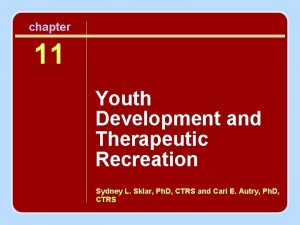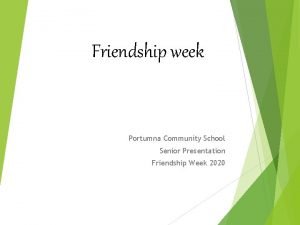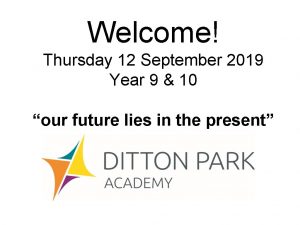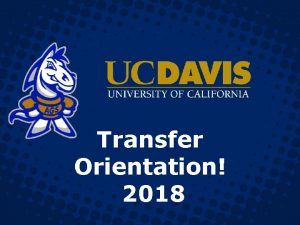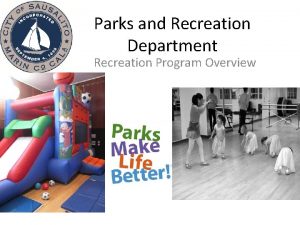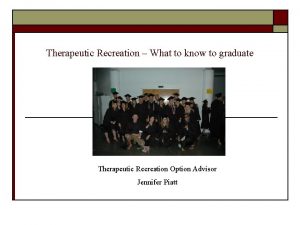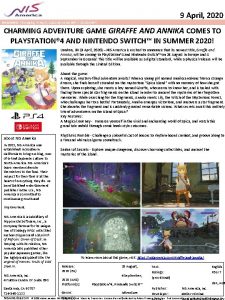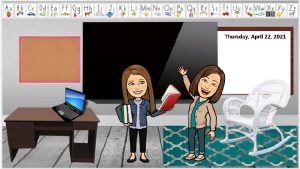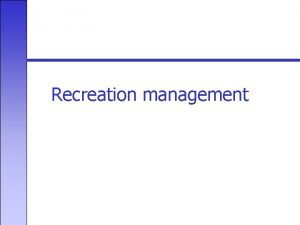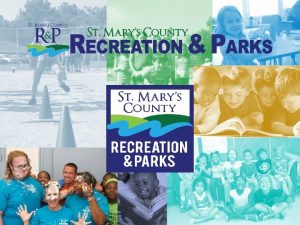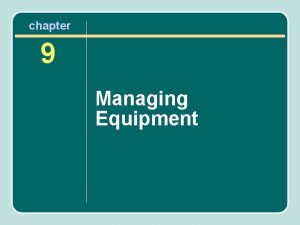Therapeutic Recreation InternshipPracticum Thursday April 23 rd 2020
























- Slides: 24

Therapeutic Recreation Internship/Practicum Thursday April 23 rd, 2020 Devan Mc. Neill, Marina Christman, Zac Crouse, & Aimee Douziech

Agenda Documents required Application Process and considerations Internship Preparation and extra information Interviews Internship Manual Conflict Management Sick Time/Time away Code of ethics and standards of practice

Documents required Police Information Check with Vulnerable sector search – letter on the website Immunization Record – on the website HSPnet Consent Form for those applying to Alberta Health Services (AHS), NSHA, and others – on the website https: //www. uleth. ca/healthsciences/practicum-therapeuticrecreation

Application Process (with AHS) A maximum of 3 applications can be submitted for the first round of applications. If none are successful then there will be another application round around mid to late June 2020 Resumes and Cover letters for AHS sites to be submitted by April 27 th 2020 to Marina Christman (marina. Christman@uleth. ca) All Resumes and Cover letters emailed to Marina by April 27 th 2020 will be submitted to the designated internship sites by Marina through HSPnet. Marina has the only access to this website. Do not contact AHS internship supervisors unless they contact you.

Application Process (outside of AHS) Resumes and Cover letters for non-AHS sites can be directly submitted by student to the site, unless otherwise stated. There is no limit on how many non-AHS sites you apply for, but be aware of your time and energy. Ensure that Devan and Marina are aware of any non-AHS sites you have applied for or are planning on applying for as we need to ensure there is an affiliation agreement in place between the U of L and the potential internship site.

Application Process (additional information) Generally you will be informed by approximately mid to late May 2020 if you are going to be considered for an interview/internship at any of the sites you applied for by the April 27 th deadline. From there if you are being considered an interview will likely take place around early to mid June 2020. If none of the internship sites you applied for accept you then you will go through another round of internship applications. This is a common process for students, so don’t worry that you didn’t make the first round.

Internship Preparation Register for the course, TREC 4550 XA, or TREC 4550 XB through the Bridge. You must be registered in the course! The internship Manual is now posted on the University of Lethbridge TR website for you to review. Please take the time to review this document thoroughly as it includes relevant information for various aspects of your internship. Take the time to familiarize yourself with the assignments, the various forms/agreements, responsibilities, NCTRC job tasks, etc.

Interviews – How to prepare To prepare for the internship interview it’s important to rehearse sample questions beforehand know what kind of questions might be asked during the interview. There is no need to memorize your answers, but you should be able to speak about knowledge areas related to Therapeutic Recreation. Some sample questions may be: What characteristics do you possess that would make you a good candidate? Why did you pick therapeutic recreation as your field of interest? What types of experiences do you have working with special populations? Tell me about your understanding of a holistic approach to treating patients or clients. What are your strengths? What areas you could improve on? Have you had experience managing aggressive clients? Explain.

Interviews Continued There may be behavioural scenario questions as well, where the interviewer wants to know how you would deal with hypothetical situations or situations you have dealt with in the past. How would you respond in a conflict situation with a staff member? How have you dealt with conflict with a supervisor in the past? We will get to some specific examples later on.

Interviews Continued Lastly, there may be a case study question that briefly describes a client or patient’s history, strengths and weaknesses, needs, interests, etc. Your job is to quickly assess the person and come up with a plan of action. What would a goal be for this person, some programs that would fit their needs and abilities, and how would you assess the effectiveness of your plan?

Case Study #1 Maura is a 41 -year-old female who attends a day hospital community program. Her psychiatrist has sent a referral to TR because Maura’s parents and staff at the day program are concerned about Maura’s escalating behavioral problems and her ability to function independently. Staff report that she is difficult to interview because she typically answers with monosyllables. Maura contracted HIV through intravenous drug use. She is currently clean of drugs and has been for three years. She converted from HIV to AIDS 2 years ago and the progression has been rapid. Most of the symptoms she is experiencing are cognitive although she does have poor endurance and tires easily. Maura comes to the program clean and well groomed. She says that her mother does her hair for her and takes good care of her. Maura’s mother reports that Maura resents taking showers and gets very agitated when she is tired. Maura is unable to identify any goals for herself. She likes listening to loud rock music and watching TV. Maura’s parents say the weekends are tough because all she wants to do is watch TV all day. They want her to be involved in some other kind of activity.

Case Study #2 Dorothy is a 58 -year-old female who was referred to the TR department following a back injury. Dorothy’s back injury occurred two weeks ago as she was lifting her 2 - year-old grandson. Other diagnoses are diabetes and obesity. She complains of moderate discomfort in her back when sitting, standing and walking. Also, she describes mild to moderate pain in her feet while standing and walking. Dorothy was assessed by her family physician following her back injury. The diagnosis was “back strain”, with no significant neurological or disc involvement. She is insulindependent, and is currently taking Tylenol 1 for pain relief. Dorothy is a divorced mother of one daughter, who is a student and often asks Dorothy to provide childcare for her two-year-old son. Dorothy worked part-time as a store clerk until her diabetes caused her to leave her job 5 years ago; she is now on long-term disability benefits. She lives alone in a main floor apartment and does not own a vehicle. Her daughter and a friend provide transportation for shopping and appointments. Dorothy’s leisure interests are sedentary ones. She expressed frustration with being unable to visit friends, attend her weekly social group, and do needlework. Increasing her sitting and walking tolerance was identified as a priority for her quality of life.

Interviews Continued At the end of the interview always have a few questions that you can ask the interviewer. Research the facility and setting, look at their mission and vision, know how many recreation therapists work at the agency and see if any there any gaps in your understanding. Some sample questions would be: What is the model of therapeutic recreation you use here? Why? What would the work schedule be? To assist you with knowledge based questions please review the 2014 NCTRC Job Analysis – Knowledge Areas https: //www. nctrc. org/wpcontent/uploads/2019/05/Job. Analysis. Report. pdf. Questions could be asked about anything related to the knowledge areas, so go through them all and see if you could answer a question related to each item.

Internship Manual Now let’s take a look at the Fall 2020 and Spring 2021 Internship Manual, posted on the U of L website. This can be found as a PDF and a WORD document for your records once the course begins. It’s important to be familiar with it. Any questions?

Conflict Management *** Often conflict is a result of mis-communication*** How to try and prevent workplace conflict: Communicate, communicate! Open communication is so important. If unsure about something, then be open to discuss the topic. If there is something bothering you, don’t wait for someone else to bring it up or for it to develop into unnecessary conflict – you bring it up. Be direct and communicate. Remember that as important as it is to talk, it’s also important to listen. Be professional and respectful to others. Remember that its natural for different people to have differences of opinion – respect and acknowledgement of those is important. This doesn’t have to result in conflict. In fact it can result in collaboration!


Conflict Continued If conflict arises anyway: Communicate Be open and listen to what others may be trying to say to you Talk directly to the person who you are having some sort of conflict with, and make sure to hear what they may have to say as well Forgive and move on after the conflict has been addressed – holding on will only make the conflict persist

Conflict Resolution Scenarios 1. While discussing your special project with your supervisor, they inform you about a couple options they think you should do, however you disagree and already have an idea that you would like to do for your special project. How do you address this potential conflict? 2. Your internship supervisor has completed your mid-term evaluation. Upon review of it you notice that they didn’t mark you what you had expected. How do you prevent this from being a surprise? How do you address this situation after the fact?

Conflict Resolution Scenarios 1. You have one of your SMART goals as “independently conduct 3 in house assessments by the end of week 4” however you are already well into week 4 and haven’t done any assessments independently yet. When you bring this up to your supervisor, they respond that the completion of your goals is your responsibility. How could this situation have been prevented? How do you address this after the fact? 2. You are at the point in your practicum where your supervisor has now given you their full caseload as well as the responsibility to delegate and supervise the assistants. One of the assistants continuously doesn’t follow your direction and continues to do what they feel is best. How do you approach this?

Conflict Resolution Scenarios 1. You are feeling frustrated that you are in week 3 of your internship and you haven’t even seen an assessment yet even though there have been numerous admissions to the unit. How should you address this situation? 2. During a care conference you are speaking about a client and your supervisor interrupts you and corrects you about something in front of everyone. You are feeling belittled, embarrassed, and upset with your supervisor. How can you address this with your supervisor so it doesn’t happen again?

Sick Time/Time Away If you have a serious illness or personal emergency causing the absence or the inability to work at least 20 hours per week then you will need to contact NCTRC to potentially apply for an alternative internship. You can take up to 2 consecutive weeks off if it is an emergency, but no longer. NCTRC Internship Guidelines: https: //www. nctrc. org/wpcontent/uploads/2017/09/Alt. Internship. Guidelines. pdf If time is missed, you will need to make up the hours (Saturdays, staying late, etc. ) while continuing to not work more than allowable maximum of 45 hours per week. Hours are the most important #! Vacations, weddings, etc. are not to be planned during the internship.

Code of Ethics – ATRA (2018) The Recreation Therapist: is obligated to be competent in the service of defined Standards of Practice for Therapeutic Recreation. is committed to the continuous task of learning and self-improvement, to increase individual effectiveness as a professional. encourages the trust and confidence of the client and others through professional conduct and appearance. encourages and participates in projects or research aimed at upgrading professional services, and communicates the results of these efforts. acknowledges inherent human rights guaranteed by law and treats each client with dignity and respect. recognizes the client has the right to accept or refuse any therapeutic recreation service recommended to him/her. responds to requests for information and education. Requests are referred to appropriate sources when information is beyond the resources of therapist or agency. will conduct all programs with due regard to the safety of the client, other clients, colleagues, and himself/herself. is obligated to preserve and protect the confidentiality of any information, either medical or personal, acquired through professional contact with the client, except where disclosure of such information is necessary to the service or treatment of the client, or is a legal requirement of the courts. functions as a cooperative member of a treatment team for the delivery of effective health care. serves as an advocate for Therapeutic Recreation by promoting the purpose, values, and ethics of the profession.

Standards of Practice – CTRA (2006) Assessment Intervention Plan Development Intervention Plan Implementation Documentation Evaluation Interdisciplinary Collaboration Professional Development Research Ethics Sensitivity to Diversity Risk Management https: //canadian-tr. org/wpcontent/uploads/2015/02/Standards_of_Practice_2006 -English. pdf

 Therapeutic recreation models
Therapeutic recreation models History of therapeutic recreation
History of therapeutic recreation Therapeutic recreation program sydney
Therapeutic recreation program sydney Dua for thursday
Dua for thursday 997ni1xcmkw -site:youtube.com
997ni1xcmkw -site:youtube.com Senior g friendship thursday
Senior g friendship thursday Wednesday bellringer
Wednesday bellringer Uk easter traditions
Uk easter traditions Sunday monday tuesday wednesday
Sunday monday tuesday wednesday Thursday night prayer
Thursday night prayer Adjectives for tuesday
Adjectives for tuesday Wednesday morning prayer
Wednesday morning prayer Why did the yazoo land fraud occur?
Why did the yazoo land fraud occur? Timeline of romeo and juliet act 3
Timeline of romeo and juliet act 3 How's the weather there
How's the weather there Welcome thursday
Welcome thursday Welcome thursday
Welcome thursday Celebrate the resurrection images
Celebrate the resurrection images Thursday morning prayer
Thursday morning prayer Holy thursday
Holy thursday Welcome thursday
Welcome thursday Wednesday evening prayer
Wednesday evening prayer Monday saturday thursday
Monday saturday thursday Terrific thursday
Terrific thursday New deal tennessee valley authority
New deal tennessee valley authority
